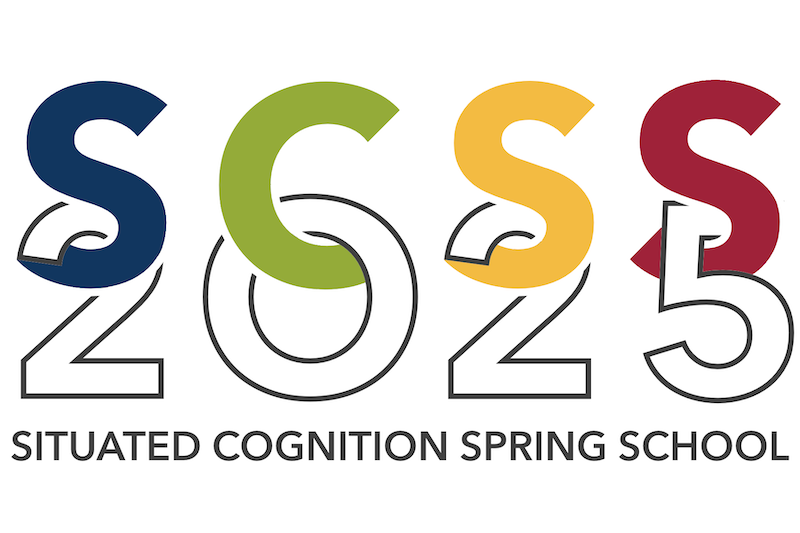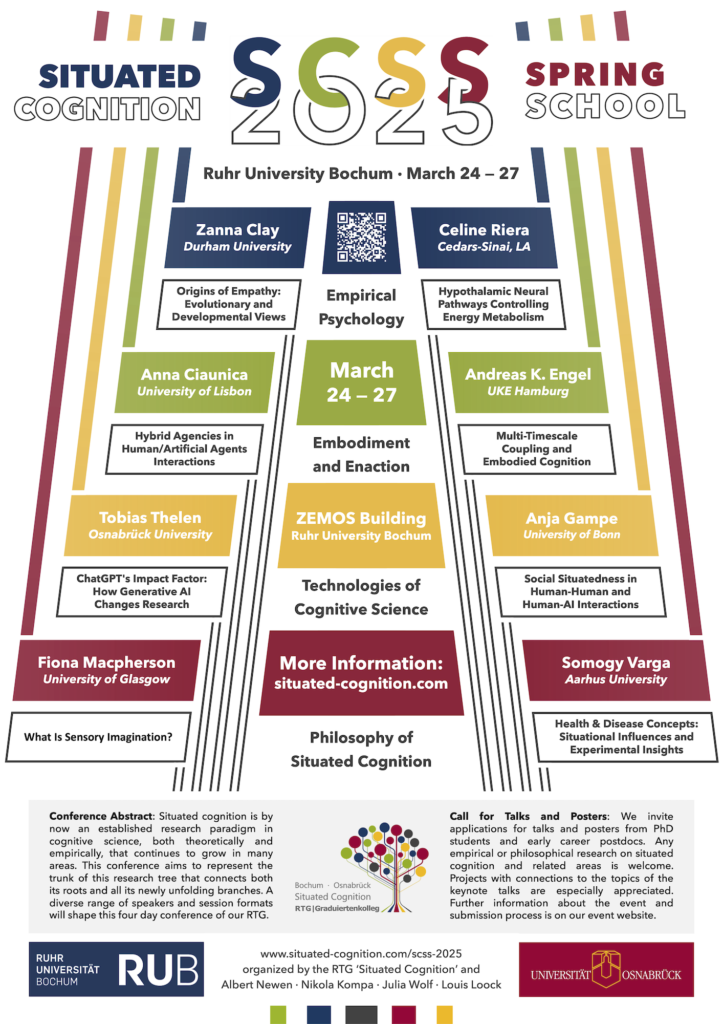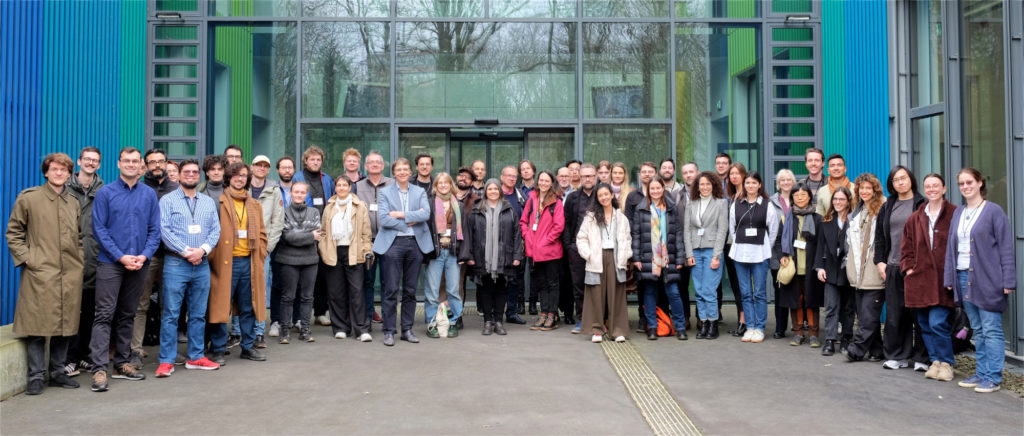

Situated Cognition Spring School (SCSS) 2025: “Situated Cognition in Human Minds, Animal Minds and AI Systems”
Abstract
This spring school of situated cognition brings together a diverse range of researchers working on mind and cognition, and how they relate to the body and environment. We strive to provide an extensive overview of state-of-the-art theorizing, experimenting, observing and surveying of all kinds of situated phenomena in humans, non-human animals and AI systems. The relevance and impact of these advancements is then also reflected upon for the scientific domain and beyond. We are therefore delighted to have a lineup of excellent keynotes coming from diverse backgrounds and with different interests ranging from, but are not limited to, philosophy, psychology, neuroscience, animal research, sociology, and artificial systems. Doctoral students and early postdocs from Europe or abroad were cordially invited to apply for a talk or poster presentation. We aim to provide an open and collaborative environment to foster intensive discussion, networking and exchange with leading experts as well as fellow students of this continuously growing area of research.
Participation and Registration
Online participation is free and requires no registration, so feel welcome to join via the Zoom link below. However, if you would like to participate as a guest listener on-site, please send an email to Rebecca Watzlawek (rwatzlawek [at] uos DOT de) so that we can prepare the venue location accordingly.
Tuition is free given our funding as a DFG-funded Research Training Group located at Ruhr University Bochum and Osnabrück University.
Streaming
The keynote talks will be streamed via Zoom to anyone interested (no registration needed). Please use the following credentials to join:
Zoom Meeting-ID: 858 6648 7644
Zoom Kenncode: K97h19
Zoom Link: https://us02web.zoom.us/j/85866487644?pwd=dVyt0k2vAZAlnj1PPyEB3ZJd2wRDAM.1
Topics
In this workshop we are extremely happy to bring together leading researchers presenting topics from various fields within situated cognition research:
- Empirical Psychology
- Embodiment and Enactment
- Technologies of Cognitive Science
- Philosophy of Situated Cognition
Keynote Speakers (alphabetical order)
To give us insights into the topics, we are delighted to announce the diverse range of speakers guiding us through their work:
- Zanna Clay (Durham University)
- Anna Ciaunica (University of Lisbon)
- Andreas K. Engel (UKE Hamburg)
- Anja Gampe (University Duisburg-Essen)
- Fiona Macpherson (University of Glasgow)
- Celine Riera (Cedars-Sinai, LA)
- Tobias Thelen (Osnabrück University)
- Somogy Varga (Aarhus University)
Additionally, Rhiannon McNeil (University Hospital Würzburg & ALBA Network Ambassador) will host a discussion on “Justice in Academia”.
Further speakers will include members of the RTG and those selected by the previous call.
Program Overview
Monday, March 24
| 10:30 – 11:40 | Online Keynote | Anna Ciaunica University of Lisbon | Hybrid Agencies in Human/Artificial Agents Interactions |
| 11:40 – 12:20 | External Postdoctoral Researcher | Juan Diego Bogotá University of Jyväskylä | Can Social Interaction Constitute the Experiential Self? |
| 12:20 – 14:00 | Lunch | ||
| 14:00 – 14:40 | Internal Postdoc | Julia Wolf Ruhr-University Bochum | Pretend Play – Enacted and Imagined |
| 14:40 – 14:50 | Short Break | ||
| 14:50 – 16:20 | Poster Session (with Coffee) | ||
| 16:20 – 17:20 | Equality Discussion | Rhiannon McNeill University Hospital Würzburg & ALBA Network Ambassador | Reflection on Justice in Academia |
| 17:20 – 18:30 | Keynote | Somogy Varga Aarhus University | Health and Disease Concepts: Situational Influences and Experimental Insights |
| 19:00 | Dinner: Q-West |
Tuesday, March 25
| 09:00 – 10:10 | Keynote | Fiona Macpherson University of Glasgow | What Is Sensory Imagination? |
| 10:10 – 10:40 | Coffee Break | ||
| 10:40 – 11:20 | Internal PhD | Yizhi Li Ruhr University Bochum | Why is Mind Wandering Effortless? |
| 11:20 – 12:00 | Associated PhD | Louis Loock Osnabrück University | Extracted Cognition: How Natural Intelligence Deals With Artificial Intelligence |
| 12:00 – 12:15 | Photo Session | ||
| 12:15 – 14:00 | Lunch + Change of Room | ||
| 14:00 – 16:00 | Group Discussion I | (find groups below) | |
| 16:00 – 16:30 | Change of Room + Coffee Break | ||
| 16:30 – 17:10 | Internal PhD | Alessandra Mascaro Osnabrück University | A Methodological Exploration of Prosocial Behaviours in Wild Central Chimpanzees |
| 17:10 – 18:20 | Keynote | Zanna Clay Durham University | Origins of Empathy: Evolutionary and Developmental Views |
| 19:00 | Informal Dinner: Farina |
Wednesday, March 26
| 09:00 – 10:10 | Keynote | Anja Gampe University of Bonn | Social Situatedness in Human–Human and Human–AI Interactions |
| 10:10 – 10:30 | Coffee Break | ||
| 10:30 – 11:10 | Internal PhD | Leonard Kulisch Ruhr-University Bochum | Pathology or Normalcy? Culture and Child Separation Anxiety |
| 11:10 – 11:50 | External PhD | Rasmus Overmark University of St Andrews | Pragmatic Relativity in Mentalizing Development: The Case of Quotative ‘be Like’ |
| 11:50 – 12:10 | Coffee Break | ||
| 12:10 – 13:20 | Keynote | Tobias Thelen Osnabrück University | ChatGPT’s Impact Factor: How Generative AI changes Research |
| 13:20 – 14:30 | Lunch | ||
| 14:30 – 15:30 | Joint Commute to Hattingen | ||
| 15:30 – 18:00 | Social Event | Guided Tour in Hattingen | |
| 19:00 | Conference Dinner: La Mesa |
Thursday, March 27
| 09:00 – 10:10 | Keynote | Andreas Engel UKE Hamburg | Multi-Timescale Coupling and Embodied Cognition |
| 10:10 – 10:50 | Internal PhD | Aitana Grasso Cladera Osnabrück University | Approach-Avoidance Bias: Exploring Cognitive Processes and Brain Dynamics |
| 10:50 – 11:20 | Coffee Break | ||
| 11:20 – 13:20 | Group Discussion II | (find groups below) | |
| 13:20 – 14:30 | Lunch | ||
| 14:30 – 15:10 | External PhD | Niccolò Nanni University of Turin | Olfaction in the Wild – Situated Olfaction and Olfactory Content |
| 15:10 – 15:50 | Internal PhD | Syrine Rekhis Osnabrück University | Embodied Olfaction and Taste Perception via Metabolic Processes: A Bidirectional Communication |
| 15:50 – 16:10 | Coffee Break | ||
| 16:10 – 17:20 | Keynote | Celine Riera Cedars-Sinai, LA | Hypothalamic Neural Pathways Controlling Energy Metabolism |
| 17:20 – 17:30 | Closing & Fare Well |
For all our events, we are committed to following our Discussion Guidelines. You can find them here or download them below.
Poster Presentations
Our spring school will also host young researchers from around the globe who will give poster presentations in a dedicated session.
| No. | Poster Presenter | Affiliation | Poster Title |
| 1 | Joan Camarena Bononad | Universitat de València | The Role of Synergies for Perception and Action. The Case of Echolocation |
| 2 | Anil Bayindir | Ruhr University Bochum | The Neural Representation of the Pigeon’s Body Plan |
| 3 | Claudio Fabbroni | Università degli Studi di Napoli Federico II | The Heuristic Value of Mental Representations in Cognitive Science |
| 4 | John Madrid Carvajal | Osnabrück University | Dimensionality in Motion: Investigating the Sensorimotor Dynamics of Human Behavior in Natural Environments Using Virtual Reality |
| 5 | Laura Coccia | Università degli Studi di Milano | In Search of Embodied Consciousness |
| 6 | William Angkasa | Ruhr University Bochum | MIND Script: A Cognitive Blueprint for Seamless Social Interaction |
| 7 | Hector Omar Ruiz Rivera | University of St. Andrews | Is Hostility Scaffolded? |
| 8 | Johannes Brinz | Osnabrück University | How Neuron-Like are Artificial Neurons? |
| 9 | David Walsh | University College Cork | The Work of Art for Alva Noë and Kitarō Nishida |
| 10 | Kirill Leshchinskii | Osnabrück University | Depersonalisation as Boundary Situation: Anxiety, Alienation, Authenticity |
| 11 | Sofia Livi | Scuola Normale Superiore di Pisa | Affective Perception and the Situated Self |
| 12 | Sofia Pedrini | Ruhr University Bochum | Imaginative vs. Mnemic Justification: Epistemic and Phenomenal Differences |
| 13 | Agnieszka Jaworska | Cardinal Stefan Wyszyński University | The Unconscious Imagination from the Perspective of Predictive Processing |
| 15 | Jannis Friedrich (& Martin Fischer) | German Sport University Cologne & Potsdam University | Higher-Level Cognition under Predictive Processing: Lessons from Structural Representations and Grounded Cognition |
| 16 | Daniel Müller (& Carmen Mossner) | Osnabrück University | “And lead us not in temptation”: A New, Situated Approach to Self-Control |
Venue
We would like to provide our registered guests with some directions for download (to be posted here soon). Furthermore, we also refer to the website of our conference venue building for detailed directions: ZEMOS
Organizers
This workshop is organized by members of the RTG “Situated Cognition”:
- Albert Newen (Speaker; Ruhr-Universität Bochum)
- Nikola Kompa (Deputy speaker; Universität Osnabrück)
- Julia Wolf (Scientific coordinator; Ruhr-Universität Bochum)
- Louis Loock (Deputy scientific coordinator; Universität Osnabrück)
Poster

Group Photo
